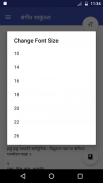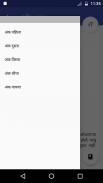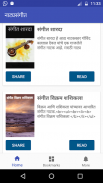







Marathi Natya Sangeet नाट्यसंगीत

Descrizione di Marathi Natya Sangeet नाट्यसंगीत
Natya Sangeet (नाट्यसंगीत) is a form of Indian classical and semi-classical music. The name literally means Dramatic Music and the musical dramas are then called as Sangeet Natak. It is also one of the two popular forms of vocal arts in Maharashtra and surrounding states.
Natya Sangeet is said to have originated in the 19th century in a region that is now the state of Maharashtra in India. In past music was monopoly of Princes and other rich class.common people could not enjoy classical music. It basically emerged so that the common people could also enjoy classical music as it is based on classical base.
In 1879, Playwright and producer Trilokekar independently presented his musical play Nal-Damayanti (नल-दमयंती) to Marathi public. It was the first musical play on Marathi stage. Later on Balwant Pandurang Kirloskar (or Annasaheb Kirloskar) staged his first musical play Shakuntal on October 31, 1880 which was based on Kalidas's play Abhijñānaśākuntalam.
Annasaheb Kirloskar wrote shakuntal in 1880, thereby starting a new tradition in Maharashtra. During its early period, Sangeet natak was dominated by religious plays like Sangeet Saubhdra. The trend changed with the coming of sangeet Manapman, which depicts bravery of its hero Dheryadhar and his love with Bhamini which was written by Krushnaji Prabhakar Khadilkar.
During the 1960s, another turn came with the emergence of Jitendra Abhisheki, who was credited with applying simplicity to the complex composition of Natya Sangeet.
विष्णुदास भावे यांनी मराठी रंगभूमीचा श्रीगणेशा केला तर संगीत नाटकाचा लौकिक अर्थाने प्रारंभ अण्णासाहेब किर्लोस्कर यांच्या संगीत शाकुंतल (१८८०) या नाटकाने झाला. त्यानंतर सौभद्र, रामराज्यवियोग, द्रौपदी, विद्याहरण, शारदा, स्वयंवर, मानापमान, संशयकल्लोळ, एकच प्याला ...अशा संगीत नाटकांची परंपराच निर्माण झाली. १८८० ते १९३० हा संगीत नाटकांच्या आणि पर्यायाने नाट्यसंगीताचा सर्व अर्थांनी सुवर्णकाळ होता.
If you want a specific drama (natak) to be added, please let us know in the comments.
This app contains following dramas:
- एकच प्याला
- संगीत शारदा
- संगीत मानापमान
- संगीत सौभद्र
- संगीत स्वयंवर
- संगीत शाकुंतल
- संगीत विद्याहरण
- संगीत मृच्छकटिक
- संगीत विक्रम शशिकला
- संगीत संशयकल्लोळ
- संगीत श्री
Natya Sangeet (नाट्यसंगीत) è una forma di musica classica e semi-classica indiana. Il nome significa letteralmente musica drammatica ed i drammi musicali vengono quindi chiamati come Sangeet Natak. E 'anche una delle due forme popolari di arti vocali in Maharashtra e stati circostanti.
Natya Sangeet si dice abbia avuto origine nel 19 ° secolo in una regione che oggi è lo stato del Maharashtra in India. Nella musica passato era monopolio dei Principi e altri ricchi persone class.common non poteva godere della musica classica. E 'emerso in sostanza in modo che la gente comune potrebbe anche godere la musica classica in quanto si basa su base classica.
Nel 1879, drammaturgo e produttore Trilokekar presentato in modo indipendente il suo gioco musicale Nal-Damayanti (नल-दमयंती) al pubblico Marathi. E 'stato il primo gioco musicale sul palco Marathi. Più tardi Balwant Pandurang Kirloskar (o Annasaheb Kirloskar) messo in scena la sua prima commedia musicale Shakuntal il 31 Ottobre 1880 che si basava su un gioco da Kalidas Abhijñānaśākuntalam.
Annasaheb Kirloskar scritto shakuntal nel 1880, iniziando così una nuova tradizione in Maharashtra. Durante il suo primo periodo, Sangeet Natak è stata dominata da drammi religiosi come Sangeet Saubhdra. Il trend è cambiato con l'avvento di Sangeet Manapman, che raffigura il coraggio del suo eroe Dheryadhar e il suo amore con Bhamini che è stato scritto da Krushnaji Prabhakar Khadilkar.
Nel corso del 1960, un altro giro è venuto con l'emergere di Jitendra Abhisheki, che è stato accreditato con l'applicazione di semplicità alla complessa composizione di Natya Sangeet.
विष्णुदास भावे यांनी मराठी रंगभूमीचा श्रीगणेशा केला तर संगीत नाटकाचा लौकिक अर्थाने प्रारंभ अण्णासाहेब किर्लोस्कर यांच्या संगीत शाकुंतल (1880) या नाटकाने झाला. त्यानंतर सौभद्र, रामराज्यवियोग, द्रौपदी, विद्याहरण, शारदा, स्वयंवर, मानापमान, संशयकल्लोळ, एकच प्याला ... अशा संगीत नाटकांची परंपराच निर्माण झाली. 1880 ते 1 9 30 हा संगीत नाटकांच्या आणि पर्यायाने नाट्यसंगीताचा सर्व अर्थांनी सुवर्णकाळ होता.
Se si vuole un dramma specifico (Natak) da aggiungere, fatecelo sapere nei commenti.
Questa applicazione contiene seguenti drammi:
- एकच प्याला
- संगीत शारदा
- संगीत मानापमान
- संगीत सौभद्र
- संगीत स्वयंवर
- संगीत शाकुंतल
- संगीत विद्याहरण
- संगीत मृच्छकटिक
- संगीत विक्रम शशिकला
- संगीत संशयकल्लोळ
- संगीत श्री

























